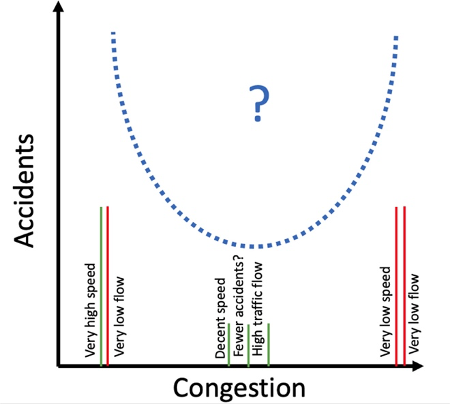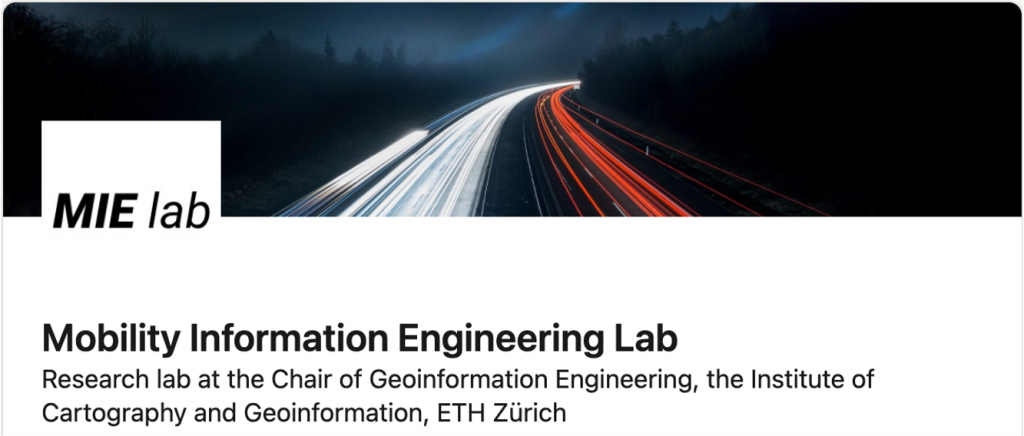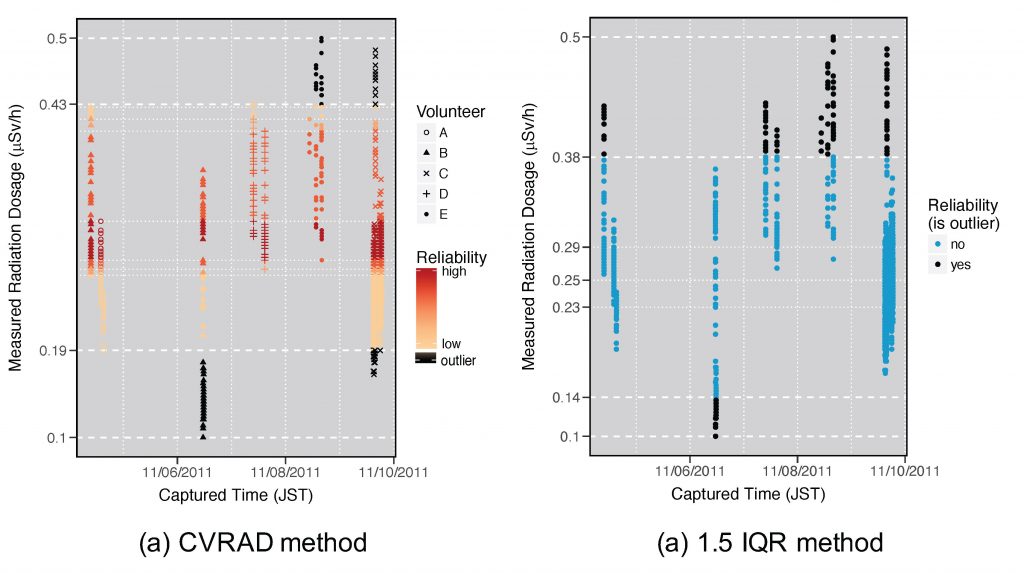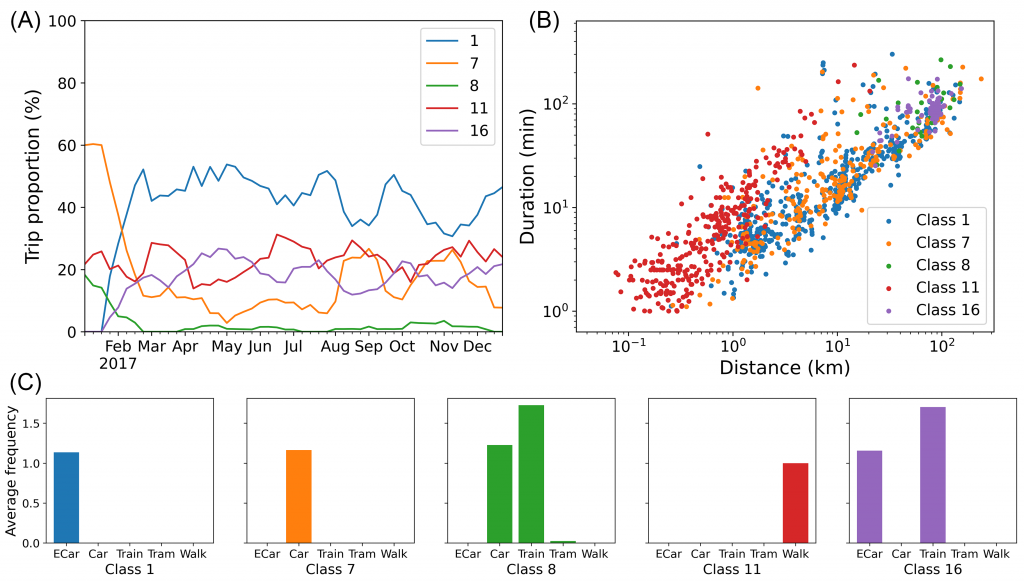MIE-Lab members attended the Zürich Mobility Data Workshop sponsored by IARAI at the University of Zürich on July 20th. The workshop brought together researchers based in Zurich that work on different mobility research topics to discuss the results and insights learned in the NeurIPS Traffic4cast competition series organized by IARAI. The workshop sparked a lively discussion on the challenges and opportunities of open mobility data. The workshop is co-organized by Yanan Xin, Cheng Fu (GIScience Center, UZH), together with Christian Eichenberger and Moritz Neun (Institute of Advanced Research in Artificial Intelligence, IARAI).
Best paper award at AGILE conference
Our paper “Unlocking Social Network analysis methods for studying human mobility” received the Best Paper Award at the 25th AGILE Conference on Geographic Information Science! Nina Wiedemann presented the paper in Vilnius, Lithuania, and it was elected by the audience out of three papers pre-selected by the conference committee. In the paper we demonstrate how network modelling methods can help to gain insights into the topology and spatial layout of mobility graphs. For more details, see the publication in the conference proceedings.
New article in Renewable & Sustainable Energy Reviews published
How well can you charge your battery electric vehicle with solar power generated from your own roof?

Our latest journal article “Using rooftop photovoltaic generation to cover individual electric vehicle demand—A detailed case study” shows that this works surprisingly well even without a dedicated battery home storage.
The article was also featured in the ETH News and other media outlets. Check out the press release or the journal article published in Renewable & Sustainable Energy Reviews (open access).
3rd place in the Traffic4cast 2021 extended challenge
Nina Wiedemann of MIE Lab achieved 3rd place in the NeurIPS 2021 Traffic4cast competition!
In this year’s extended challenge, the task was to predict traffic volume and speed in unknown cities, based on movie-format spatio-temporal data. Our team could improve the generalisation ability of the convolutional neural network with a patch-based approach. For more details on the method, check out our preprint on arXiv.
New Survey Paper Is Published – “Applications of Deep Learning in Congestion Detection, Prediction and Alleviation: A Survey”
How can deep learning be used to make road travel safer and faster at the same time? Can we achieve these two objectives while ensuring fairness across individuals or user groups? How important is the percentage of data available for better model performance? Are there potential conflicts of interest if a small number of private players cater to the route suggestion requirements for the majority of the population? Check out the latest publication from MIE-lab- “Applications of deep learning in congestion detection, prediction and alleviation: A survey”, authored by Nishant Kumar and Prof. Dr. Martin Raubal. The paper attempts to answer these questions based on the current state of research. The paper is available open access at TR:C.
As the title suggests, the paper covers three specific tasks. In the first part (congestion detection), we summarize how the deep learning models that were initially developed for computer vision tasks are being applied in detecting traffic congestion. A clear distinction is seen between the models and data sources used in different geographical locations. In the second part (congestion prediction), we summarize why congestion prediction is a more difficult task than traffic prediction. We discuss specific examples of how researchers have leveraged the domain knowledge from transportation (such as the heterogeneity of road networks) to improve the overall prediction accuracy of deep learning models. In the third part (congestion alleviation), we summarize how deep learning is being used for alleviating congestion. We review the challenges in implementing demand-side solutions argue in favour of system-level optimizations with the policymaker in the loop.
Finally, we draw attention to the bigger picture and the potential clash of interests between our efforts to alleviate recurrent and non-recurrent congestion. Presented below is a hypothetical U-curve showing the current understanding of how traffic congestion and road safety are related.

New Project “Interpretable and Robust Machine Learning for Mobility Analysis” Starts
Our new project “Interpretable and Robust Machine Learning for Mobility Analysis” officially starts today! The project aims to bring together the knowledge of GIScience and Machine Learning, advancing our understanding of how interpretable and robust machine learning methods (especially deep learning methods) can be tailored to mobility analysis with the support of causal inference. This research is funded by the Hasler Foundation and is in collaboration with the Swiss Data Science Center. Please check out our project page for more information.

MIE Lab LinkedIn Page Is Launched
We launched our MIE Lab LinkedIn page! Follow our updates on LinkedIn here.

We Welcome Dr. Esra Suel to MIE Lab
Dr. Esra Suel joins our team as a Senior Assistant. She is a Research Fellow (part-time) at the School of Public Health, Imperial College London. Since 2018, she also held a Senior Data Scientist position at the Swiss Data Science Center, ETH Zurich where she collaborated with MIE Lab. She obtained her PhD from the Centre for Transport Studies, Imperial College London. Esra’s current research focuses on using emerging sources of large-scale data (e.g., remote sensing, aerial imagery from drones, street-level imagery, mobile phones, and crowd-sourced data) coupled with advances in deep learning methods, along with traditional (e.g., survey-based) data to advance how we make measurements in urban settings and quantify change, ultimately aiming for advanced data-driven policy and behaviour changes for improving urban life.

New IJGIS Paper Is Published – “Anomaly Detection for Volunteered Geographic Information: A Case Study of Safecast Data”
A paper titled “Anomaly Detection for Volunteered Geographic Information: A Case Study of Safecast Data” by Dr. Yanan Xin is recently published online.
Volunteered Geographic Information (VGI) is a promising new data source for scientific research. However, many scientists are concerned about the quality of VGI data for research, given the lack of rigorous and systematic quality control procedures. This study contributes to the improvement of VGI quality by proposing a Cross-Volunteer Referencing Anomaly Detection (CVRAD) method to filter anomalous measurements in mobile environmental sensing data, using the crowdsourced Safecast radiation data set as a case study. The method is validated using both official KURAMA car-borne survey data and filtered measurements by Safecast moderators. The validation results demonstrate that the anomaly detection method can successfully identify abnormal values and reduce errors in the VGI data when sufficient volunteers are present; thereby increasing the overall accuracy of the data. The code developed to support the findings of the paper is available in figshare.com.

A Clustering-Based Framework for Individual Travel Behaviour Change Detection
In our recently published 2021 GIScience paper “A Clustering-Based Framework for Individual Travel Behaviour Change Detection“, we propose a clustering-based pipeline to delineate travel behaviours and detect possible change periods/points from raw GPS recordings. In particular, considering trip mode, trip distance, and trip duration as travel behaviour dimensions, we measure the similarities of trips and group them into clusters using hierarchical clustering. Two different methods are then proposed to detect changes in an individual’s observed usage proportion of trip clusters. Through testing the framework on a large-scale longitudinal GPS tracking dataset, we demonstrate its effectiveness in detecting change periods/points by jointly considering multiple travel behaviour dimensions.
The code is openly available on GitHub, with the possibility to reproduce the framework on the Geolife dataset. The study is to be presented at GIScience 2021 and the pdf version is available here.
